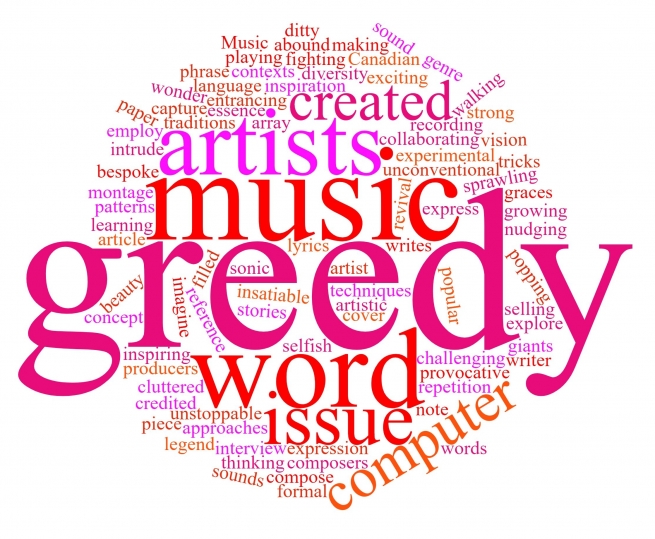
“In 1993, I was making word clouds because I wondered what my computer’s hard drive was thinking about during its idle time,” Canadian writer and artist Douglas Coupland said in a 2013 interview. This summer, I wondered what my hard drive (aka my brain) was doing when I was at the computer editing this issue. Because an odd word—at least when applied to music—seemed to keep popping up. Was my subconscious playing tricks on me? Was a word actually fighting to be noticed in my increasingly cluttered cloud of a mind, nudging me to imagine its meaning in a music context, and suggesting, perhaps, a theme?
Coupland is credited by many as the person who created the concept of word clouds, the first notable expression being the “subconscious files” that were typeset in a particular way in his 1995 novel Microserfs, i.e., a weighted list of words selected from a fictional character’s electronic diary by a computer program. Those of us who work closely all day with words—on paper, screen, or both—tend to notice patterns, repetition, common usage errors, or, say, the popular revival of an old word (bespoke!), and sometimes a word or phrase will stick in our head (like a pop ditty) and intrude on our daily life for a while.
That’s what the word greedy did to me, these past weeks.
First one composer, then another, said “greedy” in an article I was editing, and then . . . yet another? Was that right? When I was away from the computer, usually while walking, greedy would pop into my head. I’d try to remember who said it. Why are they greedy? I’d wonder. What does greedy mean in the context of composing (not buying or selling) music?
Greed, as we know, is one of the seven deadly sins, and most current dictionary definitions of greedy give its meaning as a strong or selfish desire to have it all—it being food, money, fame, or the like. In this issue of Musicworks, three composers use the word greedy with a touch of self-deprecating humour—like they know their keen and growing desire to explore and employ in their work many instruments, approaches, or sounds is not in line with the more formal settings of musical traditions and learning that they started out in.
Break free, get greedy, make music!
“I wanted to play more instruments and I wanted to try and write lyrics, I wanted to compose and . . . I’m very greedy!,” Nadah El Shazly tells Mary Dickie. “I was and am very greedy,” says Amy Brandon, when explaining to Sara Constant how she needs to draw from every genre and sonic language she’s encountered to express her musical vision. “I think much of my music has too much material—like I’m too greedy: I want to use everything I found in the same piece,” William Kuo tells Nick Storring, in reference to unconventional techniques he’d been using to develop new compositions.
Greedy music artists abound in this issue, and their stories are inspiring. Ana Sokolović, who graces the cover of this Fall 2019 issue, tells new contributor Holly Harris that she draws inspiration from everything—“art, beauty, and life in general.” New Age legend Laraaji talks to Jesse Locke about the wide array of different artists and producers he’s been collaborating with lately: “They help me expand faster into experimental directions that I hadn’t considered.” Fellow septuagenarian Charlie Morrow has not only collaborated with a “sprawling constellation” of twentieth-century giants, writes Bart Plantenga, but also created sound and music works in such a diversity of artistic and commercial contexts that it would require “several book-length volumes to capture his full essence.”
Morrow created an entrancing montage, comprising several of his notable works, especially for the Musicworks 134 recording, which is filled with exciting, challenging, and sometimes provocative music by these unstoppable, insatiable artists. Greedy is good!